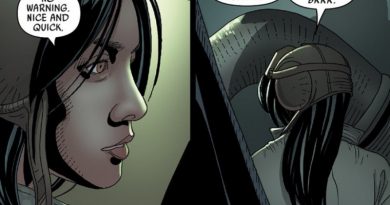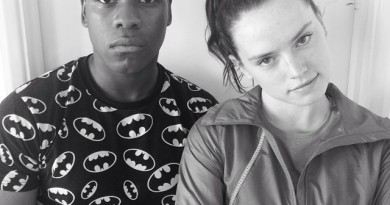The Clone Wars: Season Five In Review: Part Three
Our Season in Review for The Clone Wars Season Five continues with the Ahsoka arc, a defining story for many of the series’ most important characters. Be sure not to miss Part One and Part Two, which discuss the earlier episodes in the season.
The Ahsoka arc is centered around the choices she makes. Most notably to make a leap of faith rather than return with Anakin, to cooperate with Asajj Ventress while on the run, and to refuse to the Jedi Council’s offer to rejoin the Order at the end. Which choice do you think was the most important, or most defining, for her character?
Tricia: The choice to refuse the Jedi Council’s offer, because it was proactive rather than reactive. Ahsoka takes the leap of faith because she feels she has no choice to maintain her innocence and retain her life as a Jedi. She initially cooperates with Asajj as a means to that end as well, but begins to recognize that they aren’t that different, except Ahsoka had a better shot at becoming a good person. The journey to becoming a hero is all about agency. Luke Skywalker doesn’t turn the targeter off because he’s forced by the situation into that decision, but rather he believes it’s the right thing to do. And that choice defines who he is. As I see it, Ahsoka had much the same moment at the end of the series.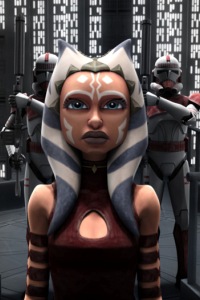
Lex: It’s hard to argue with her final choice to refuse the Council’s offer as the most important, but in some ways her leap of faith is the more definitive moment in her independent decision-making. While Ahsoka has certainly had her share of creatively interpreting or outright disobeying orders in the past, those instances didn’t arise from her belief that the orders were wrong; instead, she just had the confidence (or overconfidence) to think she could exceed expectations. That moment in the drainage pipe, when Anakin orders her to come back with him to the Jedi Temple, is the first time she truly faces a situation where she no longer believes that her superiors will do the right thing. Ahsoka can either comply anyway, as a dutiful Jedi would, or she can follow her own sense of what the Force is telling her. She literally turns her back on Anakin and takes a leap of faith in herself. Once she’s done that, their rationalizations and apology in the final episode will inevitably ring hollow to her.
Megan: Ultimately I think her refusal of the Jedi Council’s offer was the more important choice. It changed her whole life. It was also more defining because, while her jump off the drainage pipe was certainly her choice, and one in which she chose the harder road for herself, she didn’t have as much time to think about it. It was a split-second decision, whereas she had more time to chose that she was going to refuse the whole Council as well as Anakin. The pipe scene was a foreshadowing of the council scene, and I think the jump was meant to symbolize that she was already putting distance between herself and Anakin. She would have known then that going back to the Jedi was still an option. After she handed her Padawan braid over of her own volition, it wasn’t anymore.
Speaking of Asajj Ventress, she’s traveled quite a path over the span of The Clone Wars, from ruthless Separatist assassin to Nightsister to bounty hunter. She’s worked with Count Dooku and Mother Talzin, teamed up with Boba Fett and Obi-Wan Kenobi, and in this arc served as Ahsoka Tano’s guide through the undercity. What has been your favorite part of her character development?
Tricia: Asajj has been molded and shaped by many people for their own personal gain, but she has an indomitable spirit. She is a survivor. What I like is that she moved past being a pastiche of a villainous character and has some depth. 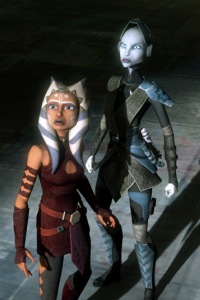 The audience can see that very real desires motivate her – she seeks approval, to be part of a family or something bigger than herself, and possibly even to fight for the underdog.
The audience can see that very real desires motivate her – she seeks approval, to be part of a family or something bigger than herself, and possibly even to fight for the underdog.
Lex: She’s always been a fun character in The Clone Wars, even when she was doing Dooku’s bidding as his assassin. Asajj has some great lines of dialogue in the early seasons, especially when she’s facing off with Jedi like Luminara, Ahsoka, or Anakin. But she really starts to shine once Sidious orders Dooku to eliminate her, and she has to start acting and choosing for herself – in other words, when Katie Lucas took the reins for the story arc involving Ventress, Savage, Mother Talzin, and Darth Maul for three episodes in Season Three and four in Season Four. It’s hard to pick a favorite moment, but I’m especially fond of the empathy and conscience she reveals in “Bounty” and her banter-laden teamwork with Obi-Wan in “Revenge.”
Megan: A lot of Asajj’s actions in the finale made me think back to “Bounty,” where Ventress looks into the sky and wonders where she’s going to go. In the finale she’s going somewhere, she’s surviving, but she still seems unhappy, and I like to think that helping Ahsoka helped her find her place in a small way. She didn’t lose her prickliness and her ferocity, but it changes her to the point that she’s willing to help Anakin. So I guess my favorite part of her development is her conversation with Anakin, seen through the lens of “Bounty.”
The villain in the arc is also a female character: Barriss Offee. But we’re definitely left with more questions than answers. Did she plan from the beginning to frame Ahsoka specifically? Did she act entirely alone? Was she in league with Sidious all along? Or did she perhaps unknowingly get assistance from Sidious and Tarkin, such as the prison infiltration to frame Ahsoka for the murders of Letta and the clonetroopers? Share your favorite speculation about the truth behind Barriss’ deeds.
Tricia: Honestly, I’m not sure I need to know all the details. There was enough set-up in Season Two for me to believe Barriss’ turn could happen. Sidious’ machinations work because each person isn’t aware of the next piece in the grand plan. In my mind he is the picture of patience; he just keeps pushing events in the right direction until individuals do what he suspects they will. Tarkin is scarier as a true believer, but that doesn’t mean he won’t work the situation to his advantage – such as there being no other camera angles available except the one of Ahsoka appearing to choke Letta. With that said, Barriss’ speech was reminiscent of Anakin’s rationalizations in Revenge of the Sith. More likely than not, she was led to those conclusions.
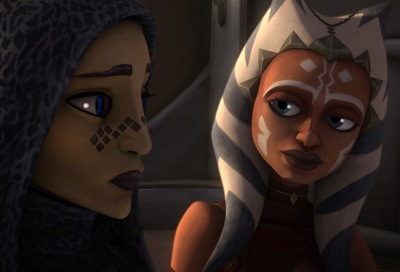 Lex: The lawyer in me can’t help trying to fit all the pieces together, especially after an opening episode to the arc that hit all the beats of a police-procedural show like CSI, completely with the Caruso-droid. Initially I thought Ahsoka might just have been the unlucky Jedi who drew the bombing investigation assignment, but there’s a brief line from Letta when she explains that her Jedi conspirator told her to contact Ahsoka if she needed help. So it does seem that Barriss intended to frame Ahsoka all along. Which would fit perfectly into Sidious’s master plan: just as he needs to drive a wedge between Anakin and Obi-Wan in Revenge of the Sith – by means of manipulating the Council into asking Anakin to spy on the Chancellor – he would need to eliminate Ahsoka, a powerful force for light in Anakin’s life who might be able to prevent his fall to the dark side if she were still in the picture. Yet there’s nothing in the episode to hint at any actual connection between Sidious and Barriss. So perhaps, like General Krell, she’s just a Jedi who took actions that ultimately worked to Sidious’ opportunistic advantage, even though he didn’t set them in motion.
Lex: The lawyer in me can’t help trying to fit all the pieces together, especially after an opening episode to the arc that hit all the beats of a police-procedural show like CSI, completely with the Caruso-droid. Initially I thought Ahsoka might just have been the unlucky Jedi who drew the bombing investigation assignment, but there’s a brief line from Letta when she explains that her Jedi conspirator told her to contact Ahsoka if she needed help. So it does seem that Barriss intended to frame Ahsoka all along. Which would fit perfectly into Sidious’s master plan: just as he needs to drive a wedge between Anakin and Obi-Wan in Revenge of the Sith – by means of manipulating the Council into asking Anakin to spy on the Chancellor – he would need to eliminate Ahsoka, a powerful force for light in Anakin’s life who might be able to prevent his fall to the dark side if she were still in the picture. Yet there’s nothing in the episode to hint at any actual connection between Sidious and Barriss. So perhaps, like General Krell, she’s just a Jedi who took actions that ultimately worked to Sidious’ opportunistic advantage, even though he didn’t set them in motion.
Megan: I would have liked to know for sure whether Barris and Sidious were connected, and thought that the writers had made a mistake in not explaining that until I thought about how The Clone Wars usually sticks to telling the story from the main characters’ points of view. Because Anakin and Ahsoka didn’t know, and their relationship was one of the most important aspects of the arc, maybe the writers didn’t think it was important for us to know whether Barriss and Sidious were connected. Personally I think that they were: Barriss would have needed some sort of clearance to get inside the Republic prison. Tarkin, on the other hand, I think was more likely to be a free agent. Tarkin is selfish and anti-alien, and giving himself more power as an emissary of the Republic through taking power away from the Jedi, with an alien taking the fall, seems like his style without any of Sidious’ machinations. This is also me believing that Barriss is essentially good: the idealistic part of her scheme where she wanted to expose the Jedi as basically murderers and warmongers fits with her, but I think she would have had to be talked into framing her best friend for it.
Another important female character in this era is Padmé. She appears briefly as Ahsoka’s defense counsel in the military tribunal, but otherwise has been basically absent in Season Five. (Based on the trailers, she would have played an important role in the three-episode Clovis arc, which ended up not airing during the season.) Were you disappointed to see so little of Padmé this season? Why do you think that occurred?
Tricia: This is a tough question. Would I have liked to have seen more of Padmé? Yes. But honestly I had some trepidation about the Clovis arc. It seemed as if they were setting up a situation where Padmé witnessed more of Anakin’s violent nature. In Attack of the Clones, I believe she rationalized his slaughter of the Tuskens because she perceived them as savages. While the arc may have moved our understanding of Anakin along, I wonder how much it would have strengthened Padmé’s portrayal. It’s possible this arc may be part of the “bonus content” so we may get a chance to reflect on it if that comes to pass.
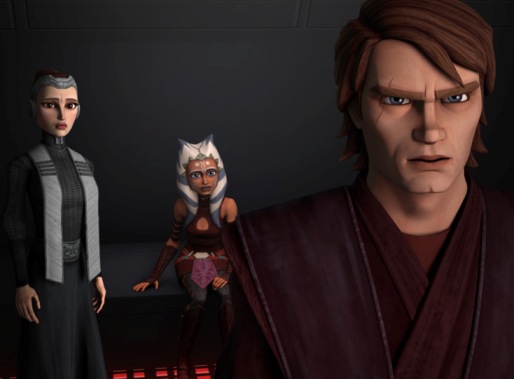 Lex: I was definitely disappointed to see so little of Padmé in Season Five. She’s had some really great stories in The Clone Wars, showcasing her political courage, personal bravery, badass fighting skills, and willingness to risk her own life for causes she believes in. Season Four’s “Shadow Warrior” did a wonderful job of illustrating that Padmé and Anakin have a lot more in common than it sometimes appears – in the end, she makes the same kind of choice he would, putting her personal feelings ahead of political duty. Even so, two-episode arcs were the most she’d been given previously, so from one angle it’s a good sign that she would have been at the center of a three-part arc this time. Still, like Tricia I was apprehensive about the implications of the Clovis arc for Padmé’s character based on the glimpses in the Season Five trailers. If it’s a moot point now, maybe that’s a good thing.
Lex: I was definitely disappointed to see so little of Padmé in Season Five. She’s had some really great stories in The Clone Wars, showcasing her political courage, personal bravery, badass fighting skills, and willingness to risk her own life for causes she believes in. Season Four’s “Shadow Warrior” did a wonderful job of illustrating that Padmé and Anakin have a lot more in common than it sometimes appears – in the end, she makes the same kind of choice he would, putting her personal feelings ahead of political duty. Even so, two-episode arcs were the most she’d been given previously, so from one angle it’s a good sign that she would have been at the center of a three-part arc this time. Still, like Tricia I was apprehensive about the implications of the Clovis arc for Padmé’s character based on the glimpses in the Season Five trailers. If it’s a moot point now, maybe that’s a good thing.
Megan: I didn’t really feel either way about it. It was nice to see Padmé as a voice for the Republic, and it made sense for her to be there, but despite the fact that there was certainly some place for her if they’d shortened the droid arc I didn’t really miss her this season. She’s just not one of my favorite characters, and the presence of Steela, Bo-Katan, Ahsoka, Asajj, and others means that it’s not like Padmé’s presence would have been essential to the gender balance of the season.
Although Ahsoka is the center of this arc, Anakin also plays a critical role. We see their teamwork in the first episode, his faith the Jedi will do right by her in the second episode, his reluctant hunt for her in the third episode, and his angry quest to clear her name in the fourth episode – and of course their tearful farewell in the final minutes. Which aspect of Anakin’s portrayal in this arc did you find most effective?
Tricia: Well, Anakin was Anakin. And for that matter Obi-Wan was Obi-Wan and the Jedi were the Jedi. The whole arc is Ahsoka doing what none of them were capable of doing – taking a moment to reflect and just say, “No, this isn’t right.” Anakin served as an effective mirror to Ahsoka, who actually goes through a journey.
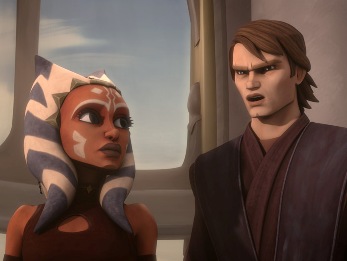 Lex: I really liked Anakin’s portrayal throughout this arc, but the most revealing moment in the four episodes may be his appearance before the Jedi Council when he persuades them to let him join Plo Koon in the pursuit of Ahsoka in the undercity. In all three movies in the Prequels, a strong undercurrent to Anakin’s interaction with the Jedi boils down to “why don’t you place any trust in me?” In The Phantom Menace, Anakin scowls at being told he’s too old and too attached to be trained; they don’t even want to give him a chance. In Attack of the Clones, Anakin resents what he perceives as Obi-Wan holding him back, and Palpatine studiously reminds him that despite his skills, the mission to Naboo is his first assignment on his own. In Revenge of the Sith, he specifically tells Padmé the Jedi don’t trust him, and he sees it repeatedly in their actions toward him. So it was a great touch to work that dynamic into this Ahsoka arc as well, showing the Jedi Council doubting Anakin’s ability to do his duty and his earnest need to prove to them yet again that they should trust him. Maybe if they’d been willing to believe in him all along, he would have been able to believe more in the Jedi way in return – and make different fateful choices.
Lex: I really liked Anakin’s portrayal throughout this arc, but the most revealing moment in the four episodes may be his appearance before the Jedi Council when he persuades them to let him join Plo Koon in the pursuit of Ahsoka in the undercity. In all three movies in the Prequels, a strong undercurrent to Anakin’s interaction with the Jedi boils down to “why don’t you place any trust in me?” In The Phantom Menace, Anakin scowls at being told he’s too old and too attached to be trained; they don’t even want to give him a chance. In Attack of the Clones, Anakin resents what he perceives as Obi-Wan holding him back, and Palpatine studiously reminds him that despite his skills, the mission to Naboo is his first assignment on his own. In Revenge of the Sith, he specifically tells Padmé the Jedi don’t trust him, and he sees it repeatedly in their actions toward him. So it was a great touch to work that dynamic into this Ahsoka arc as well, showing the Jedi Council doubting Anakin’s ability to do his duty and his earnest need to prove to them yet again that they should trust him. Maybe if they’d been willing to believe in him all along, he would have been able to believe more in the Jedi way in return – and make different fateful choices.
Megan: It must have been tremendously hard for Anakin to let Ahsoka go, not just because they have a strong teacher-student bond but because it is in Anakin’s nature to hold onto things. He took a risk leaving his mother, and what he learned in Attack of the Clones was that to let someone go was to seal their death warrant. I think Anakin had a lot of guilt over his mother’s death that led him to obsessively try to protect the other people in his life, especially women. (Oops, now I sound like Space Freud.) He respected Ahsoka’s choice and watched her go sadly but graciously, but I think he must have had a lot of lingering pain from that. So the final scene was a great, emotional moment for Anakin. I also agree with Lex that that Council scene reinforced the issues Anakin has with the Council and shows that they were longstanding. The combination of the Council treating him like a child while his own student walks away from him certainly didn’t help his mental state.
Unlike Ahsoka, we know what the future holds for Anakin. What does Ahsoka’s departure from his life mean for Anakin?
Tricia: Ahsoka becomes another loss in his tally of family, and makes him question the Jedi Order and himself. Ahsoka seemed to be able to do what Padmé and Obi-Wan couldn’t, which was to give him balance. He saw in Ahsoka his tendencies to be rash and emotional, and Anakin tried harder to be a better Jedi. One of the best moments in the arc was when Anakin tells Ahsoka that he fights for the good people in the Jedi Order. That creates a powerful parallel to the pre-duel exchange with Darth Vader on Mustafar in Revenge of the Sith, where Obi-Wan declares he is fighting for the Republic and for democracy. With Ahsoka’s departure there is one less “good” person for Anakin to fight for.
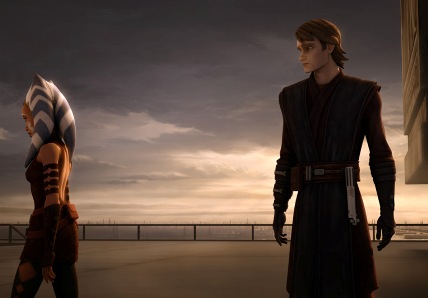 Lex: For Anakin to fall to the dark side, he has to come to harbor enough ill-will toward the Jedi that he’s willing to strike a Faustian bargain with a Sith Lord rather than lean for support on the comrades he’s been fighting alongside for three years of a brutal war, even his best friend. Part of that occurs because Anakin believes the Jedi won’t be willing to help him save Padmé from dying, so he has to turn to Sith powers to do that. What The Clone Wars has added to the calculus with Ahsoka’s fate in this arc is a traumatic loss precipitated by the Jedi Council’s own misjudgments. It’s only natural for Anakin to question whether the Jedi really are “good people” worth fighting for if they’re capable of causing so much pain to Ahsoka that she would rather walk away for good than stay and fight at Anakin’s side. If Ahsoka doesn’t think the Jedi are worth serving anymore, why should Anakin think so, either?
Lex: For Anakin to fall to the dark side, he has to come to harbor enough ill-will toward the Jedi that he’s willing to strike a Faustian bargain with a Sith Lord rather than lean for support on the comrades he’s been fighting alongside for three years of a brutal war, even his best friend. Part of that occurs because Anakin believes the Jedi won’t be willing to help him save Padmé from dying, so he has to turn to Sith powers to do that. What The Clone Wars has added to the calculus with Ahsoka’s fate in this arc is a traumatic loss precipitated by the Jedi Council’s own misjudgments. It’s only natural for Anakin to question whether the Jedi really are “good people” worth fighting for if they’re capable of causing so much pain to Ahsoka that she would rather walk away for good than stay and fight at Anakin’s side. If Ahsoka doesn’t think the Jedi are worth serving anymore, why should Anakin think so, either?
Megan: Ahsoka leaving the order means that Anakin has less reason to stay. I’m not sure whether she could have persuaded him to stay when Obi-Wan couldn’t, but she certainly would have complicated things. At least she would have been a distraction: as Anakin’s student she would tag along with him and he’d be conscious that his actions directly effect her. One could certainly get an interesting fanfic out of what would have happened if Ahsoka stayed through Episode III.
Now that she’s left the Jedi Order, Ahsoka presumably avoids the impending massacre of Order 66. Perhaps we’ll eventually get canon stories in one medium or another, but for now her future and her fate are left to fans’ imaginations. In your mind, what’s next for Ahsoka in the short run? And into the long term?
Tricia: I’m not sure Ahsoka is just going to pick up from this. Literally everything she believes in has been fractured. In fact, I would be disappointed if she just jumped into hero mode. Like Asajj, Ahsoka needs to find her own moral compass and purpose, so she might flounder a bit. When I saw the last scene of the show, it sort of seemed like the end. The Clone Wars started out as an anthology type show, but I think it earned its loyal fanbase by shifting into a vehicle to tell Ahsoka’s story. The Onderon arc takes on a different meaning in light of the show’s end. Steela, Saw, and Lux proved to Ahsoka that even one person can make a difference. I think her heroic moment might be years down the road, well past the fall of the Jedi Order she walked away from.
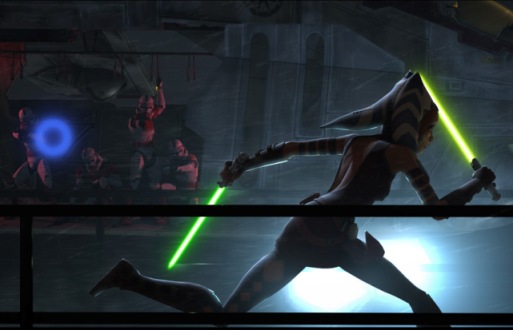 Lex: Ahsoka’s interaction with Hondo at the end of the Young Jedi arc is another example of a moment when she saw that one person making the right choices can make a difference. She questions his motives, and he refuses to admit what they are, but in the end he does the right thing and saves the younglings from Grievous. So I agree with Tricia that Ahsoka will have faith in the notion that she will be able to make a difference in people’s lives even though she’s no longer a Jedi Padawan or a Commander in the clone army. I also agree it will probably take her some time to figure out exactly how to best accomplish that, and she’ll fumble around for a purpose in the short run. The one downside to her final “I know” to Anakin – which was a great line for both of their characters – is that it means she’s probably not going to reach out to Padmé, because it would remind her too much of Anakin. Otherwise, that would have been the natural first place for Ahsoka to turn for help.
Lex: Ahsoka’s interaction with Hondo at the end of the Young Jedi arc is another example of a moment when she saw that one person making the right choices can make a difference. She questions his motives, and he refuses to admit what they are, but in the end he does the right thing and saves the younglings from Grievous. So I agree with Tricia that Ahsoka will have faith in the notion that she will be able to make a difference in people’s lives even though she’s no longer a Jedi Padawan or a Commander in the clone army. I also agree it will probably take her some time to figure out exactly how to best accomplish that, and she’ll fumble around for a purpose in the short run. The one downside to her final “I know” to Anakin – which was a great line for both of their characters – is that it means she’s probably not going to reach out to Padmé, because it would remind her too much of Anakin. Otherwise, that would have been the natural first place for Ahsoka to turn for help.
Megan: Oh, you mean besides the pony farm? In my head Ahsoka teams up with Asajj, at least for a little while. They’re both on the run and both trying to find themselves in different ways, and Asajj knows the hidden underworld of Coruscant. I think Ahsoka’s heroism for a time would be on a small scale; I recently read a fanfic where she ends up working at a clinic in a bad area of Coruscant or something, and that’s become my idea for her future. She still wants to help people, but does it in a way that will keep her out of sight. In the long term, though, I can’t see her staying completely out of the limelight: she still cares for Anakin, Obi-Wan, Riyo Chuchi, and others, and Ahsoka is not one to miss an opportunity to throw herself into the ring. Lex reminded me that Hondo is another person she might go to be on the underside of the law, although with the way he captured her I think it would take even more drastic circumstances to make an alliance between those two than it did between Ahsoka and Asajj. Darth Maul is still out there, too, and I would love to see Ahsoka run into him, although that story probably wouldn’t end well for one of them.
Part Four concludes the Season in Review with a discussion of the ending of The Clone Wars television series and its lasting legacy for Star Wars.
- Let’s Win the Season of the Force Scavenger Hunt - April 10, 2024
- Hyperspace Theories: Metamorphosis and Sacrifice in The Bad Batch Season Two - March 22, 2024
- Fangirls Going Rogue: The Bad Batch Returns - March 1, 2024









